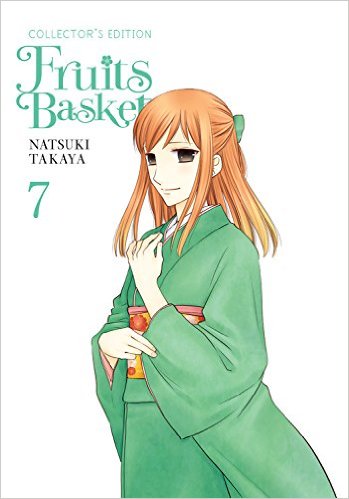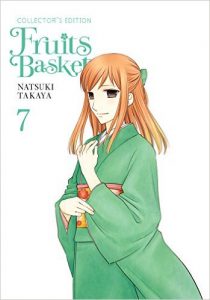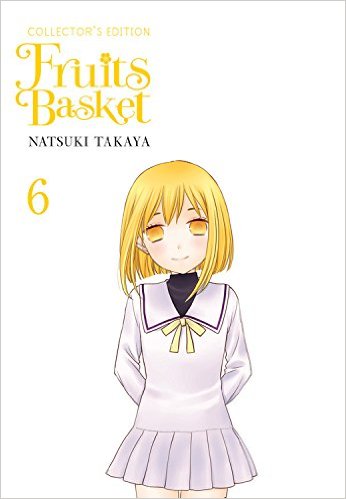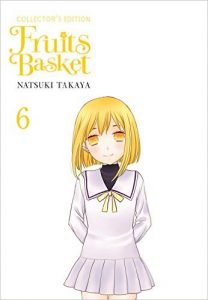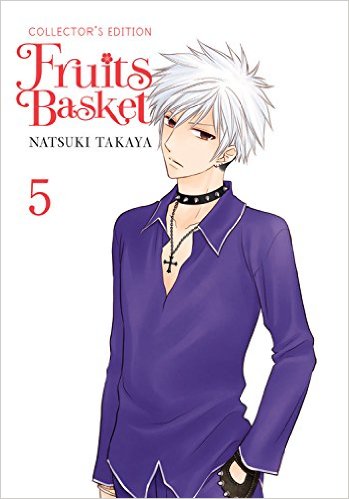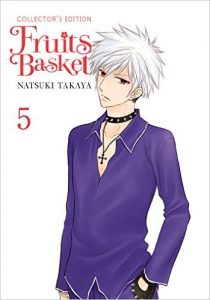By Natsuki Takaya. Released in Japan by Hakusensha, serialized in the magazine Hana to Yume. Released in North America by Yen Press. Translated by Sheldon Drzka.
I’ve discussed before how much Fruits Basket deals with abuse, and it also deals just as much with family. And while the two obviously intersect, especially in this volume, they aren’t always meant to coincide. Not everyone is the same, and no one can go through quite the same situation as someone else. This has shown up most obviously in Yuki and Kyo each being deeply envious of what the other has. In this volume we see Momiji, whose sister has been spying on him and seems to have a sense that they’re related even if she doesn’t know it for sure, choosing to remain apart from her to save his family, even though it hurts him. We also see Yuki, who has mostly repaired his relationship with Ayame (who gets the best entrance in the book here) dealing with the repressive control of his mother, and fighting back against it quite a bit. Yuki is finally growing up.
And then there’s Rin, who’s life is so tragic she doesn’t even manage to get a front cover on the omnibus she most features in. Furuba does a good job, as I said, of showing how abuse affects everyone differently, and I won’t say Rin’s is worse than the others, but it’s certainly more explicit than the others, as we see her family, which had been putting on the facade of happy cheer, break apart with just one innocent question from her. If nothing else, it shows how fragile that facade was – even if she hadn’t asked, I doubt it would have lasted much longer. Rin’s flashback is heartbreaking, as she doesn’t even begin to understand where everything went wrong, and assumes it’s her fault – something her parents and Akito are happy to tell her is the case. Luckily, she has Haru, but she’s not in a headspace right now where she can accept her need for Haru, and so drives him away as well. Basically, Rin is fascinating and makes you want to hug her, except she’d run away.
Rin’s interaction with Tohru is also interesting. Like Hiro, she’s reluctant to accept Tohru as this sort of magical healing waif, which the start of the series may have led you to believe she was. Tohru has issues, though, and it’s in dealing with Rin, who’s actively asking her why, specifically, she wants to remove the curse, that Tohru begins to crack a bit. Rin so far is the only one who’s noticed Tohru is “quietly falling apart”, and the minimalistic look at Tohru’s flashbacks suggest it’s due to her mother and her burgeoning love for Kyo (she also reacts badly when he again implies he’s going to let her move on from him). Tohru has been an all-loving heroine, but not all love is the same, and I think Tohru needs a lesson in that before she can start to genuinely help to break the curse.
This being an omnibus, there’s so much more to talk about. Shigure’s self-analysis of his character, which is wonderful – Rin may hate Shigure, but no one hates Shigure the way Shigure hates Shigure. Akito pushing Rin out the window is the most startlingly violent the series has been to date, and the fact that Hiro saw it explains quite a bit from previous volumes. The student council actually do start to have a major impact on the story here, though they’re still somewhat hermetically sealed off from the rest of the cast, and we learn some of why Kakeru is the way he is – though there’s still his connection with Tohru, which remains mysterious. And then there’s Machi, who’s mostly a cypher, albeit a violent cypher. The joy of Fruits Basket is that the omnibus gives you endless time to reread the series and linger over your favorite parts. Also, Kimi is gloriously awful and I love her.
And next month, we get Sorta Cinderella!
